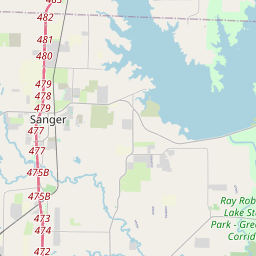City of Pilot Point
Historical marker location:






Attracted by fertile land and abundant water and game, pioneers began to settle at this site near the edge of the Cross Timbers region in the late 1840s. The village, first known as Pilot's Point, was named for a high point of timber that served travelers as a landmark. Near an early immigrant trail, Pilot Point was also a stop on the Butterfield State Route.
A townsite was platted in 1854 on land originally granted to Charles Smith. Dr. R. W. Edleman (1825-1904) of Missouri came here to launch a medical practice and open a drugstore. James D. Walcott ran the earliest general store and became the first postmaster in 1855. Alphius Knight, a settler from New York, built and conducted the first school in the town. Established by three local residents in 1872, Pilot Point Seminary was later renamed Franklin College and operated here for almost 30 years. In 1878 the town's first newspaper was published and in 1884 a bank opened.
A marketing center for farmers and stock raisers, Pilot Point had a grist mill and a cotton gin. The arrival of two railroads, the Texas and Pacific and the Missouri, Kansas and Texas, boosted the local economy in the 1880s. Agriculture and light industry form the base of the town's economy in the 1970s. (1978)
Incise on back: Marker sponsored by Chamber of Commerce
Researched by: Mavis Burton, Norma Cole, Clifton Irick, Judy Lewellen, Estelle Whitley
As one of the most visible programs of the Texas Historical Commission (THC), historical markers commemorate diverse topics in Texas history, including: the history and architecture of houses, commercial and public buildings, religious congregations, and military sites; events that changed the course of local and state history; and individuals who have made lasting contributions to the state, community organizations, and businesses.
More history nearby
Texas is known for its barbecue, and one of the most famous barbecue restaurants in the state is Kreuz Market in Lockhart. The restaurant has been in operation since 1900 and is still family-owned.
Denton County was officially established in 1846 and named after John B. Denton, a prominent figure in Texas history. The county played a significant role in the early days of Texas statehood and witnessed the challenges and triumphs of westward expansion.
Throughout the 19th century, Denton County thrived due to the expansion of railroads and the arrival of new settlers. Agriculture, particularly the production of cotton, became a key economic driver. Educational institutions, such as the University of North Texas and Texas Woman's University, were founded in Denton County during this period, establishing a legacy of academic excellence.
In the 20th century, Denton County continued to evolve. The discovery of oil in the area brought new economic opportunities, and the county experienced further growth and urbanization. Today, Denton County is a dynamic and thriving region with a diverse economy that includes sectors such as education, healthcare, technology, and manufacturing.
Denton County Timeline
This timeline provides a concise overview of the key events in the history of Denton County, Texas.
Native American Inhabitation: Before European settlement, Denton County was home to various Native American tribes, including the Wichita and Tonkawa.
Anglo-American Settlement: In the mid-1800s, Anglo-American settlers began to arrive, drawn by the fertile land and prospects for farming and ranching. The Peters Colony, a land grant company, played a significant role in attracting these settlers.
County Formation: Denton County was officially established in 1846, named after John B. Denton, a prominent preacher and soldier who died during the Texas Revolution.
Growth and Development: The county's growth accelerated with the arrival of the railroad in the late 1800s, leading to the establishment of towns such as Denton, Lewisville, and Frisco. Agriculture, particularly cotton farming, became a key economic driver in the region.
Education: Denton County became an educational hub with the founding of the University of North Texas (formerly known as North Texas Normal College) in 1890. The university has since grown into a major educational institution.
Modernization and Urbanization: In the 20th century, Denton County experienced suburban growth and industrial development, especially with the expansion of the Dallas-Fort Worth metroplex. The county's population has steadily increased, and it is now one of the fastest-growing counties in Texas.